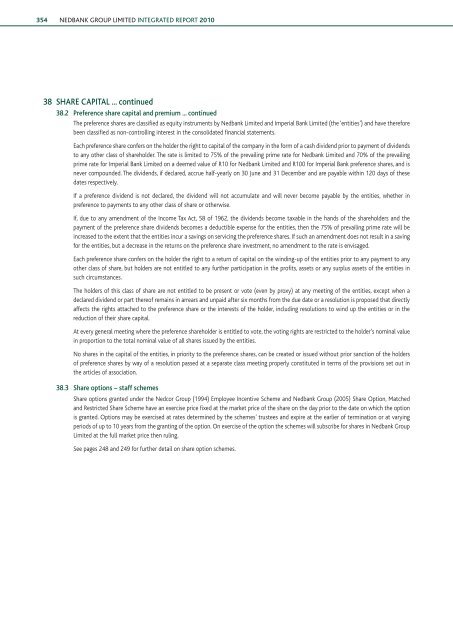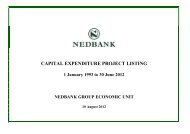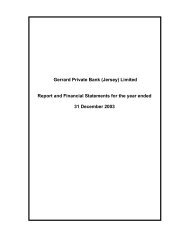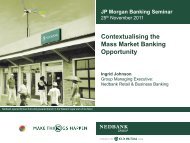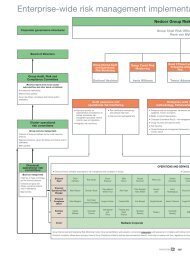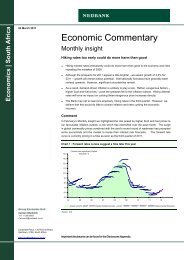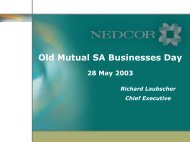Download the PDF (5.4 MB) - Nedbank Group Limited
Download the PDF (5.4 MB) - Nedbank Group Limited
Download the PDF (5.4 MB) - Nedbank Group Limited
You also want an ePaper? Increase the reach of your titles
YUMPU automatically turns print PDFs into web optimized ePapers that Google loves.
354 NEDBANK GROUP <strong>Limited</strong> INTEGRATED REPORT 201038 SHARE CAPITAL ... continued38.2 Preference share capital and premium ... continuedThe preference shares are classified as equity instruments by <strong>Nedbank</strong> <strong>Limited</strong> and Imperial Bank <strong>Limited</strong> (<strong>the</strong> ‘entities’) and have <strong>the</strong>reforebeen classified as non-controlling interest in <strong>the</strong> consolidated financial statements.Each preference share confers on <strong>the</strong> holder <strong>the</strong> right to capital of <strong>the</strong> company in <strong>the</strong> form of a cash dividend prior to payment of dividendsto any o<strong>the</strong>r class of shareholder. The rate is limited to 75% of <strong>the</strong> prevailing prime rate for <strong>Nedbank</strong> <strong>Limited</strong> and 70% of <strong>the</strong> prevailingprime rate for Imperial Bank <strong>Limited</strong> on a deemed value of R10 for <strong>Nedbank</strong> <strong>Limited</strong> and R100 for Imperial Bank preference shares, and isnever compounded. The dividends, if declared, accrue half-yearly on 30 June and 31 December and are payable within 120 days of <strong>the</strong>sedates respectively.If a preference dividend is not declared, <strong>the</strong> dividend will not accumulate and will never become payable by <strong>the</strong> entities, whe<strong>the</strong>r inpreference to payments to any o<strong>the</strong>r class of share or o<strong>the</strong>rwise.If, due to any amendment of <strong>the</strong> Income Tax Act, 58 of 1962, <strong>the</strong> dividends become taxable in <strong>the</strong> hands of <strong>the</strong> shareholders and <strong>the</strong>payment of <strong>the</strong> preference share dividends becomes a deductible expense for <strong>the</strong> entities, <strong>the</strong>n <strong>the</strong> 75% of prevailing prime rate will beincreased to <strong>the</strong> extent that <strong>the</strong> entities incur a savings on servicing <strong>the</strong> preference shares. If such an amendment does not result in a savingfor <strong>the</strong> entities, but a decrease in <strong>the</strong> returns on <strong>the</strong> preference share investment, no amendment to <strong>the</strong> rate is envisaged.Each preference share confers on <strong>the</strong> holder <strong>the</strong> right to a return of capital on <strong>the</strong> winding-up of <strong>the</strong> entities prior to any payment to anyo<strong>the</strong>r class of share, but holders are not entitled to any fur<strong>the</strong>r participation in <strong>the</strong> profits, assets or any surplus assets of <strong>the</strong> entities insuch circumstances.The holders of this class of share are not entitled to be present or vote (even by proxy) at any meeting of <strong>the</strong> entities, except when adeclared dividend or part <strong>the</strong>reof remains in arrears and unpaid after six months from <strong>the</strong> due date or a resolution is proposed that directlyaffects <strong>the</strong> rights attached to <strong>the</strong> preference share or <strong>the</strong> interests of <strong>the</strong> holder, including resolutions to wind up <strong>the</strong> entities or in <strong>the</strong>reduction of <strong>the</strong>ir share capital.At every general meeting where <strong>the</strong> preference shareholder is entitled to vote, <strong>the</strong> voting rights are restricted to <strong>the</strong> holder’s nominal valuein proportion to <strong>the</strong> total nominal value of all shares issued by <strong>the</strong> entities.No shares in <strong>the</strong> capital of <strong>the</strong> entities, in priority to <strong>the</strong> preference shares, can be created or issued without prior sanction of <strong>the</strong> holdersof preference shares by way of a resolution passed at a separate class meeting properly constituted in terms of <strong>the</strong> provisions set out in<strong>the</strong> articles of association.38.3 Share options – staff schemesShare options granted under <strong>the</strong> Nedcor <strong>Group</strong> (1994) Employee Incentive Scheme and <strong>Nedbank</strong> <strong>Group</strong> (2005) Share Option, Matchedand Restricted Share Scheme have an exercise price fixed at <strong>the</strong> market price of <strong>the</strong> share on <strong>the</strong> day prior to <strong>the</strong> date on which <strong>the</strong> optionis granted. Options may be exercised at rates determined by <strong>the</strong> schemes’ trustees and expire at <strong>the</strong> earlier of termination or at varyingperiods of up to 10 years from <strong>the</strong> granting of <strong>the</strong> option. On exercise of <strong>the</strong> option <strong>the</strong> schemes will subscribe for shares in <strong>Nedbank</strong> <strong>Group</strong><strong>Limited</strong> at <strong>the</strong> full market price <strong>the</strong>n ruling.See pages 248 and 249 for fur<strong>the</strong>r detail on share option schemes.


